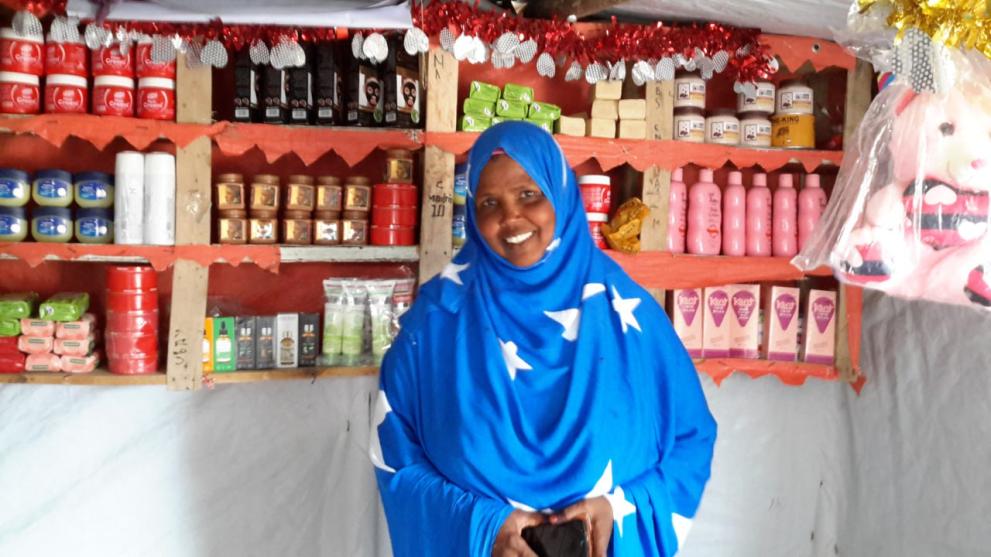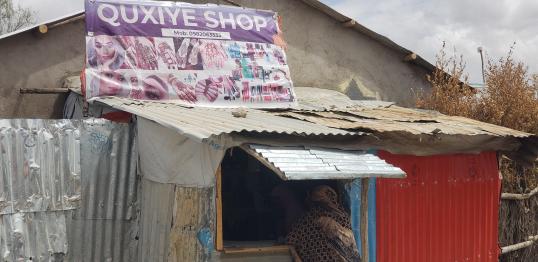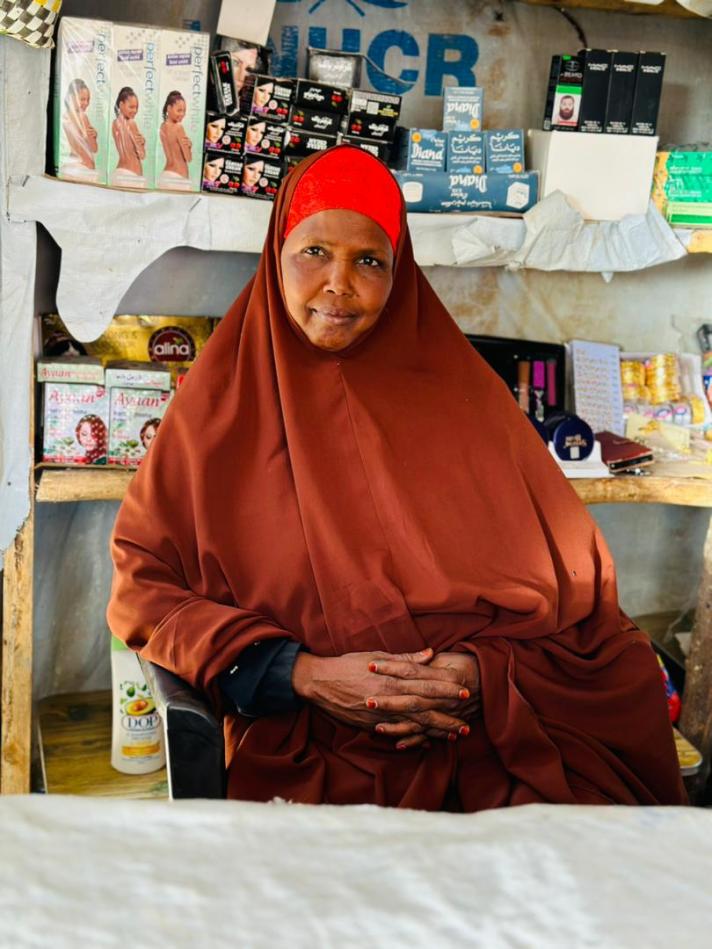
Amal Mahad Hassan, a 45-year-old mother of seven (six girls), is a refugee from Somalia and has been living in Shader refugee camp since 2013. As the head of her household, Amal has always been striving to provide the best for her children. The inter-clan conflict forced Amal’s family to flee their home in 1993 and seek refuge in Yemen, where they stayed for 20 years. However, due to the outbreak of the Arab Spring, they were compelled to flee once again, this time to Ethiopia. Reflecting on their current situation in Shader refugee camp, Amal shares:
“Now, we are here, in Shader refugee Camp, where my family and I feel at home because we live with people who share similar ethnicity, language, and religion. Likewise, my children have better confidence to play with other children from the host community without discrimination”.
However, throughout their time in the camp, Amal’s family relied solely on the monthly food assistance provided by UN agencies. To supplement their resources, Amal would sell portions of the food in order to acquire additional items for their household consumption.
Amal, with a smile, reminisced about the day she came across the business idea call from the STEDE Programme, also known as Strengthened Socio-Economic Development and Better Employment Opportunities for Refugees and Host Communities in the Jigjiga Area. In collaboration with the then Federal Job Creation Commission, which is now the Ministry of Labor and Skills, the STEDE Programme, designed the ‘’Bruh Somali Business Idea Competition’’, which was officially launched by the Somali Regional State President, Mustafe Muhumed Omer, in September 2021.
The primary objective of this competition aimed to promote job creation, increase income, and enhance job quality and security, particularly for women and youth from refugee and host communities in the targeted STEDE areas.
“I saw the advertisement of the competition for business ideas on the poster in the Shader refugee camp. I applied and passed the first screening, becoming one of the 50 preselected business idea winners of the competition. Then I attended 15 days of business development skills training organised by STEDE, and, - after the training - I prepared and resubmitted the full business proposal for the final competition”, Amal recalls.
During the pitch, Amal confidently presented her business proposal, but to her dismay, she was ranked 36th among the 35 finalists. “I was very disappointed in myself and Allah when I saw my name on the 36th rank’, she shares. However, unexpectedly, one of the finalists declined, and Amal became one of the finalists. “Thanks to Allah”, she exclaims.
With the support of the EU-funded STEDE program, Amal was granted ETB 500,000 Ethiopian Birr (ETB), approx. 8370 EUR, to which she contributed ETB 40,000 (approx. 670 EUUR). This funding enabled her to construct her own beautification and cosmetic shop in the Shader refugee camp. The income generated from the shop now covers all school and medical expenses for her family.
Amal joyfully expresses “(..) I cannot compare life before and after the support, as it helped me to generate income. Thanks to this opportunity, I managed to send my 6 children to school and one of my daughters to attend college and study for a Business administration Degree in Jigjiga”, she shares with a heartfelt smile.
Moreover, Amal believes that the opening of the Qorhiye shop, not only provides a source of income but also benefits camp inhabitants. They can now conveniently access beauty products and cosmetics in their vicinity, rather than traveling a long way to Jigjiga and paying more to get the same products and services.
“In July, I will get my second installment of 200,000 birr from Mercy Corps, and I will expand my business more, and hopefully, I will open more branches in the farthest zone of the camp soon”, Amal adds.
Amal's determination and entrepreneurial spirit shine brightly as she looks forward to expanding her business. With each step, she brings hope and prosperity to her community, proving that a single opportunity can create a ripple effect of positive change.
To learn more about the project, the video presented below provides a glimpse into STEDE's actions empowering SME's and communities alike:
More about the project:
The STEDE program, officially known as "Strengthened Socio-Economic Development and Better Employment Opportunities for Refugees and Host Communities in the Jijiga Area" started in June 2019 with the goal of enhancing employment and livelihood prospects for approximately 54,000 refugees and host community members in the Fafan zone of the Somali Regional State in Ethiopia. This 53-month project, allocated with a budget of €10 million, is funded by the EU Emergency Trust Fund for Africa and implemented by Mercy Corps in collaboration with DRC. Its primary objective is to support the Comprehensive Refugee Response Framework (CRRF) in Ethiopia by achieving the following specific goals: firstly, enhancing the local/regional economy's capacity to generate jobs aligned with existing and potential economic value chains; secondly, improving the demand-driven skills of the labour force in the intervention area; and finally, fostering improved social cohesion and access to legal rights for both refugee and host communities.
Details
- Publication date
- 27 June 2023
- Author
- Directorate-General for International Partnerships
- Region and Country
- Horn of Africa
- Ethiopia
- Thematic
- Greater economic and employment opportunities
- Strengthening resilience of communities
- Partner
- Mercy Corps
- Danish Refugee Council


